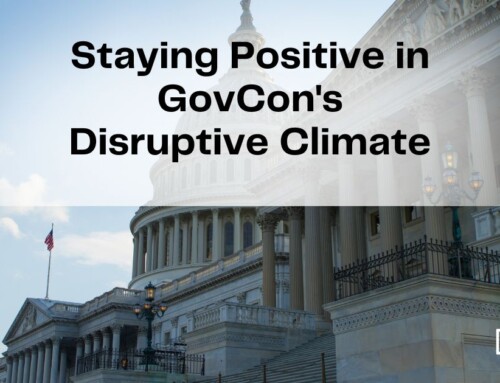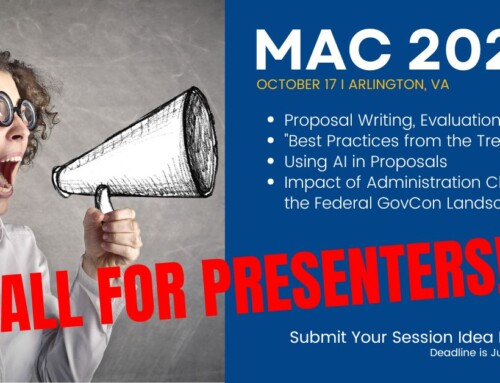In 2017, George Mason University’s department of English launched a two-course series on proposal writing. I created the courses in response to my own experiences as a new proposal writer, which began over 15 years earlier. I got my first job in the proposal world when I was 22 and just recently out of college. The moment I looked at my first RFP, I had the first of many “ah-ha” moments of my career. An English major who had just spent four years reading lengthy works of literature, finding themes across them, and writing essays trying to make sense of those themes, the process of reading an RFP, interpreting what it wanted, and writing compliant responses for an external evaluator felt like being back in class again.
As familiar as this process was, I was perplexed as to why I hadn’t ever heard of proposal writing before as a career option or even as something important that happened in the world. My college coursework included reading T.S. Eliot, memorizing pieces of The Canterbury Tales, and writing poetry, but I never heard about how writing worked in professional environments, and I’m certain I never heard about the world of proposals, which made my learning curve steep as I tried to enter the industry. Many years later, when I became an English department faculty member myself, one of my first goals was to right that wrong for future generations of English majors.
Designed to be listed across levels (so undergraduate, professional writing MA, and PhD students can find themselves in the same class), the GMU proposal writing courses move from general knowledge to specific forms of expertise that students can develop, connecting students to real-world experiences and professionals along the way.
In the first course, Proposal Writing and Development, students are introduced to what proposal writing is in broad terms. Course content is divided into three sections—proposal writing for academic research grants, proposal writing for nonprofit community development, and proposal writing for industry and federal contracting. Students gain a broad sense of what proposal writing is, what the various career paths through it look like, and the basics of each sphere. Advanced Proposal Writing allows advanced students to delve deeper, developing expertise in one area (academia, nonprofit, or federal proposal writing) intensely, through a client project and more intensive study.
Beyond teaching students the basics of how to write a proposal, the class is designed to incorporate both academic and “real world” writing practices in the classroom. Three key practices and assignments are:
- The Interview Research Project. Every semester, students are required to interview a proposal professional. This can be broadly defined in their sphere of interest: a researcher conducting grant-funded research, a proposal manager, a business owner, etc. This assignment allows students to practice a key proposal skill—how to talk to others about their expertise—while leveraging their existing networks (or building new ones) to connect students to potential mentors and career sponsors.
- Teamwork and Collaboration. Just like the “real” proposal environments, students learn valuable skills like networking, team management, project management, and group communication skills through each project. Students struggle with clients who are non-responsive (or give them too much input!), how to address lagging team members, and how to respond when requirements change. It’s a very different writing experience than a solo term paper that many think of as happening in English classes.
- Real-world Writing. Finally, the products students produce live in real ways beyond the classroom. In past classes, students have written (and won!) proposals to fund real projects, reformatted resumes, updated past performance volumes, prepared pipelines, written white papers…the list goes on and on. Connecting students to writing real documents for real purposes is another important purpose the classes take on so that students can see how to build those professional skills.
Moving forward, we hope that building deeper connections to the professional sphere, including organizations like APMP-NCA, will continue to enrich the class context. In semesters past, we have hosted APMP NCA members in our class guest lectures and annual proposal managers’ roundtable, sent students to the APMP NCA conference, and encouraged students to become members.
As the student contributions in the APMP-NCA ezine also hopefully show, students use these skills in a variety of ways. Some of them employ them directly in their own careers as proposal writers. Others take them to their other classes or academic pursuits. PhD students take the work of the class to their own classrooms, informing how they teach their writing courses and train their students to write. And across the classes, peer mentoring is strong, as students with varying levels of experience learn from as well as alongside each other. In this class, an experienced federal proposal manager (some of whom have taken the class!) will have a lot to learn from a 21-year-old who just finished an internship with an environmental advocacy organization where their main job was grant writing, and vice versa.
On the whole, across the classes, the goal is to leverage the learning that happens through exchange—across academy and industry, across students, and across university and community goals—as students build toward shared professional goals. And in our post-COVID-19 world, where jobs and opportunities become more scarce, I’m hopeful that the work the class does to shorten the learning curve might mean quicker, more impactful entry into the proposal workforce.




Leave A Comment